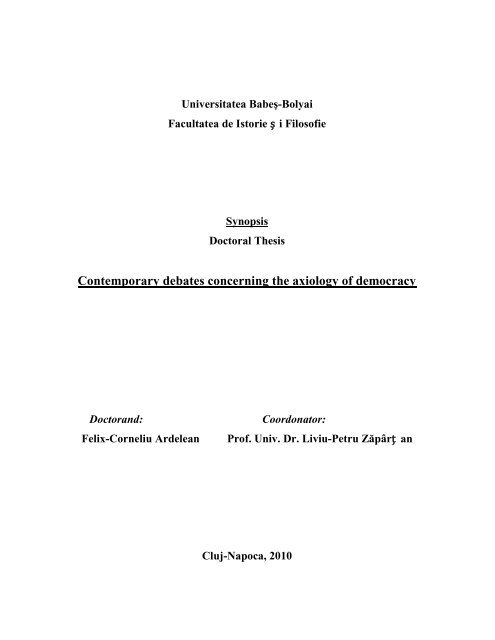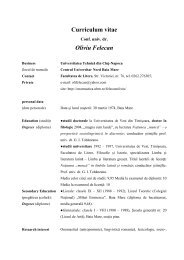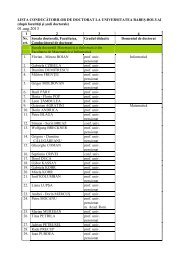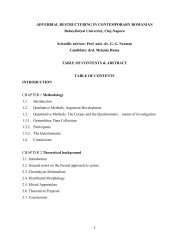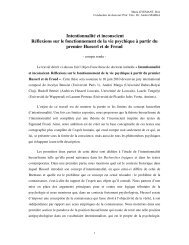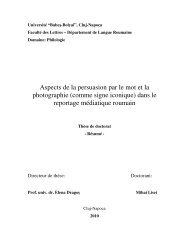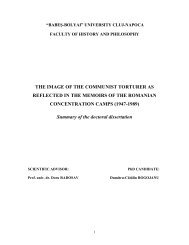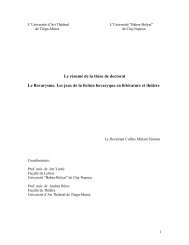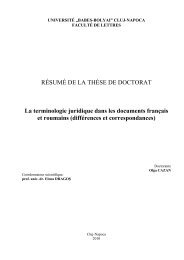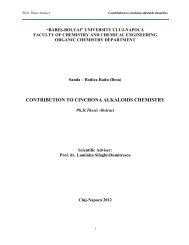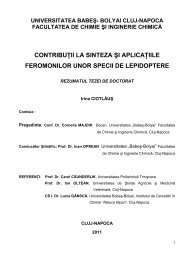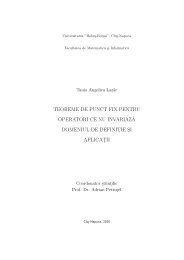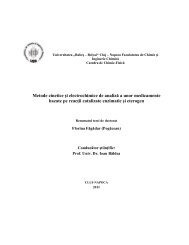Contemporary debates concerning the axiology of democracy
Contemporary debates concerning the axiology of democracy
Contemporary debates concerning the axiology of democracy
Create successful ePaper yourself
Turn your PDF publications into a flip-book with our unique Google optimized e-Paper software.
Universitatea Babeş-Bolyai<br />
Facultatea de Istorie ș i Filos<strong>of</strong>ie<br />
Synopsis<br />
Doctoral Thesis<br />
<strong>Contemporary</strong> <strong>debates</strong> <strong>concerning</strong> <strong>the</strong> <strong>axiology</strong> <strong>of</strong> <strong>democracy</strong><br />
Doctorand: Coordonator:<br />
Felix-Corneliu Ardelean Pr<strong>of</strong>. Univ. Dr. Liviu-Petru Zăpârț an<br />
Cluj-Napoca, 2010
Content:<br />
I. Conceptualization, justification and methodology<br />
II. Axiology <strong>of</strong> <strong>democracy</strong><br />
1. Liberty and <strong>the</strong> individual<br />
a) Hayek and <strong>the</strong> constitution <strong>of</strong> freedom<br />
b) Berlin and <strong>the</strong> two concepts <strong>of</strong> liberty<br />
c) Ideology <strong>of</strong> freedom<br />
2. Equality and Society<br />
a) Rawls-Nozick debate<br />
b) Dworkin and equal rights<br />
c) Ideology <strong>of</strong> Equality<br />
3. Conflict or Consensus<br />
a) Ideological conflict<br />
b) Statehood and Consensus<br />
c) Philosophy <strong>of</strong> law and political values
III. The Liberalism - Communitarianism Debate<br />
1. Communitarians and <strong>the</strong> concept <strong>of</strong> good<br />
2. Axiology and moral liberalism<br />
IV. A new axiological paradigm<br />
1.Elements <strong>of</strong> political ethics from Hegel into postmodernism<br />
2.Democracy, Power and Ethics in Habermas-Foucault debate<br />
3.Irrationality, anti-democratic and social action<br />
4.Towards an ethical <strong>democracy</strong><br />
V. Bibliography
Current <strong>debates</strong> on <strong>the</strong> <strong>axiology</strong> <strong>of</strong> <strong>democracy</strong><br />
I. Conceptualization, justification and methodology<br />
For over two millennia have passed since <strong>the</strong> first conceptualization <strong>of</strong> <strong>democracy</strong> in<br />
ancient Greece as both <strong>the</strong>ory and practice <strong>of</strong> that period were <strong>the</strong> raw material for one <strong>of</strong> <strong>the</strong><br />
fundamental <strong>debates</strong> <strong>of</strong> mankind. Wherever <strong>the</strong>re is a community, any community is <strong>the</strong> inherent<br />
problem that <strong>the</strong> rules governing it. As <strong>the</strong> community grows in complexity, as it turns into a<br />
company - inevitable - Social Norming becomes an absolute necessity. Has long been a<br />
commonplace that <strong>the</strong> individual and society are living, somewhat paradoxically, both symbiotic<br />
and conflicting factors. The main consequence <strong>of</strong> this conflict is what <strong>the</strong> Greeks called Politeia<br />
(πολιτεία) and extrapolating what we call Norming society. Regardless <strong>of</strong> ideological<br />
attachment, axiological orientation or political pragmatism can give an axiomatic character <strong>of</strong><br />
society need standardization.Varying degrees and shades in this normalization process is<br />
subjective but <strong>the</strong> process entails an absolute necessity.<br />
Within <strong>the</strong>se social norms distinguish a number <strong>of</strong> categories more or less relevant: moral<br />
norms, legal norms and economic rules. I will refer to all rules <strong>of</strong> social policy <strong>of</strong> any kind, from<br />
<strong>the</strong>ir conceptualization to development and how <strong>the</strong>ir implementation, involving all or part <strong>of</strong> a<br />
community.Before going fur<strong>the</strong>r conceptual clarification is necessary as some, for o<strong>the</strong>rs,<br />
namely purely semantic distinction between political science and political philosophy. At first<br />
glance, <strong>the</strong> distinction between <strong>the</strong> two domains <strong>of</strong> knowledge is that one is science and one's<br />
philosophy. For many people, identified with political philosophy and political <strong>the</strong>ory thus<br />
becomes a subdomain <strong>of</strong> political stint, which procupă while <strong>the</strong>ory and political practice.<br />
A new conceptualization <strong>of</strong> <strong>the</strong> nature <strong>of</strong> political philosophy and a reaction against <strong>the</strong><br />
rationalism <strong>of</strong> Western thinking is exacerbated notes from Michael Oakeshott, Rationalism in<br />
Politics, (1962).Rationalism is seen as a tragedy because <strong>the</strong> recent past giving us an<br />
independent conservative neo-classical tradition to associate it with religion, moral or social<br />
hierarchy. Also during <strong>the</strong>se years his works have been published which Hanah Arendt, from <strong>the</strong>
apolitical nature <strong>of</strong> human nature critical <strong>of</strong> traditional political philosophy whose redefinition is<br />
crucial for understanding <strong>the</strong> past totalitarian regimes, The Human Condition (1958), Between<br />
Past and Future (1961 ).Arendt sees politics as active participation in public life, as opposed to<br />
seclusion in <strong>the</strong> needs <strong>of</strong> each individual. Politics, as common public life becomes a noble<br />
expression <strong>of</strong> human nature which collectively create institutions and laws governing daily.<br />
Following Arendt, <strong>the</strong> social come to dominate politics, <strong>the</strong> burden fell increasingly common<br />
ruling <strong>of</strong> land administration needs converging mass movements, economic forces and state<br />
interference. Arendt's distinction between political and social present is rejected on <strong>the</strong> grounds<br />
that <strong>the</strong> social must be a constant concern <strong>of</strong> politics, social justice is a sine qua non <strong>of</strong> freedom<br />
and equality.<br />
In <strong>the</strong> same period were published two essays <strong>of</strong> Isaiah Berlin, Two Concepts <strong>of</strong> Liberty<br />
(1958) and Does Political Theory Still <strong>the</strong>re? (1962) outlining <strong>the</strong> plurality <strong>of</strong> moral values as a<br />
concept reducible, thus causing monism moral majority's past political philosophy. Rough shape<br />
and modern liberalism that gives Berlin is proving extremely influential in <strong>the</strong> coming decades.<br />
We can not move forward without mention Karl Popper, Leo Strauss, Eric Vogelin or FA<br />
Hayek, whose influence was observed consistently in subsequent political concepts. Can be<br />
identified three major characteristics <strong>of</strong> political philosophy in <strong>the</strong> years 1950-1960, by Bhikhu<br />
Parekh, Political Theory: Tradition in political philosophy (1996).First, <strong>the</strong>se decades have<br />
belonged to Guru. Major figures listed above were not engaged in critical dialogues, each with<br />
its own followers and establishing <strong>the</strong>ir own schools <strong>of</strong> thought. For example, Arendt's entire<br />
work <strong>the</strong>re is almost no reference to Berlin and Popper, but only a few to Oakeshott. Secondly,<br />
all <strong>the</strong>se thinkers have dealt with criticism from various political philosophy without current as<br />
positivism, existentialism and behaviorism. Reduced <strong>the</strong> political philosophy <strong>of</strong> criticism from<br />
some personal preferences without universal legitimacy being ei<strong>the</strong>r impossible or necessary, or<br />
both.<br />
The turning point in recent political philosophy was <strong>the</strong> opposite undoubtedly Magnus<br />
1971 John Rawls, A Theory <strong>of</strong> Justice. The main conceptual difference between Rawls and his<br />
predecessors was <strong>the</strong> allocation <strong>of</strong> normative political philosophy, or political philosophy is not<br />
only assuming <strong>the</strong> right to propose desirable political structure, but was also ready to deliver a<br />
<strong>the</strong>ory about man, not only about <strong>the</strong> company. Putting justice as <strong>the</strong> central concept <strong>of</strong> his
philosophy, Rawls tied her economy, psychology or social policy. Rawls's work was interpreted<br />
by many, wrongly I might say, as an argument to intervenţionalismului state in establishing a<br />
social and economic equality and this coming from a liberal <strong>the</strong>orist. Rawls has provided<br />
<strong>the</strong>oretical support to legitimize a liberal democratic state to intervene through its public policies<br />
to ensure a relatively egalitarian distribution. Sudden reaction was realized in Anarchy, State and<br />
Utopia Robert Nozick (1974) which stated that an equal distribution is derived directly from <strong>the</strong><br />
free transfer <strong>of</strong> property originally legitimate interference in free trade is wrong in<br />
principle.Nozick's <strong>the</strong>ory provides <strong>the</strong> conceptual core <strong>of</strong> liberty, Rawls tries to create a balance<br />
between liberty and equality, compatibility being one <strong>of</strong> <strong>the</strong> fundamental problems <strong>of</strong> recent<br />
political philosophy.<br />
Subsequently, noted several attempts to resolve <strong>the</strong> dispute within <strong>the</strong> meaning <strong>of</strong><br />
continuation and improvement <strong>of</strong> Rawls's <strong>the</strong>ory. Thus, it proposes an egalitarian liberal<br />
conception <strong>of</strong> justice based on a neutral dialogue (Bruce Ackerman, 1980) or participatory<br />
<strong>democracy</strong> as a fundamental value <strong>of</strong> egalitarian liberalism (Amy Guttman, 1980) or a social-<br />
democratic political program compatible with liberal values ( Wellman, 1982, Streba, Goodin,<br />
1988). Amartya Sen's attempt should be highlighted to show that equality-freedom opposition is<br />
false. In Inequality Reconsidered (1992) is growing freedom and exercise <strong>of</strong> human skills amid<br />
egalitarian ethic vary according to individual needs.We must not forget <strong>the</strong> contributions <strong>of</strong><br />
Marxist-inspired left as Kai Nielsen in Equality and Liberty (1985) where <strong>the</strong> two values are<br />
considered compatible or R. Peffer in Marxism, morality and social justice (1990) J. Reiman and<br />
<strong>the</strong> Justice and modern <strong>the</strong>ory morals (1990), which combines <strong>the</strong>ory with Rawls' conception <strong>of</strong><br />
anti-social and economic exploitation.<br />
A number <strong>of</strong> different views on <strong>the</strong> role <strong>of</strong> politics in society have emerged in modern<br />
times. A first vision for a political philosophy as interpretative and local scale (Michael Waltzer,<br />
Interpretation and Social Criticism, 1987).He criticizes abstract political philosophy requiring it<br />
to be applied to a specific community. Undoubtedly a significant pragmatic value - which is hard<br />
punch <strong>of</strong> this perspective - it is waiving <strong>the</strong> universe too high a price to pay for a domain <strong>of</strong><br />
knowledge whose aspirations do not take into account cultural differences.N u can talk about<br />
politics without discussing people and can not talk about people not report us to <strong>the</strong><br />
universal.Ano<strong>the</strong>r view has it that <strong>the</strong> main spokesman Richard Rorty, who in contingency, Irony
and Solidarity (1989), based on a concept <strong>of</strong> postmodern <strong>the</strong>ory challenges <strong>the</strong> primacy <strong>of</strong><br />
thought suggests an empirical political philosophy.Although somewhat hidden, local nature and<br />
interpretation <strong>of</strong> this doctrine remains visible, so <strong>the</strong>y raise <strong>the</strong> same objections as <strong>the</strong> previous<br />
<strong>the</strong>ory. Never<strong>the</strong>less be retained realistic criticism to <strong>the</strong>oretical thinking that require a less rigid<br />
way <strong>of</strong> thinking and abstract. These two were said conceptualization more than historical reasons<br />
that real options are clear, we believe that <strong>the</strong> nature and extent <strong>of</strong> political philosophy can not<br />
only convey <strong>the</strong> universality. The third concept is <strong>the</strong> thinkers belonging to <strong>the</strong> years 1950-1960<br />
(Arendt, Vogelin, Berlin, etc..) Reborn in <strong>the</strong> works: After Virtue (Alistair, MacIntyre, 1981),<br />
Political Theory and Modernity (William Connoly, 1988) or <strong>the</strong> Sources <strong>of</strong> Self (Charles Taylor,<br />
1990).For <strong>the</strong>m, despite <strong>the</strong> moral dimension <strong>of</strong> politics is a branch <strong>of</strong> moral philosophy but<br />
should focus on understanding human beings in modernity and to apply this understanding to<br />
specific contemporary political life. Contemplation and no prescription is <strong>the</strong> basic directive,<br />
self-knowledge and sharing this knowledge. At <strong>the</strong> o<strong>the</strong>r pole we have <strong>the</strong> followers <strong>of</strong> John<br />
Rawls's moral philosophy promoting regulatory policy aimed at <strong>the</strong> final design <strong>of</strong> political<br />
institutions and procedures.This prescriptive moral character and is found in works such as:<br />
Social Justice in <strong>the</strong> Liberal State (Bruce Ackerman, 1980) and Democracy and Power (B.<br />
Barry, 1991).<br />
Whe<strong>the</strong>r a designation <strong>the</strong>ory, science or philosophy, <strong>the</strong> study involves <strong>the</strong> study <strong>of</strong><br />
modern politics and <strong>the</strong> human as an individual member <strong>of</strong> society, rights and responsibilities<br />
inherent in that status, <strong>the</strong> study <strong>of</strong> institutions and political systems, <strong>the</strong>ir legitimacy and<br />
morality ra<strong>the</strong>r than <strong>the</strong>m trying improve <strong>the</strong>m for Policy Studies is a bare presentation <strong>of</strong> <strong>the</strong><br />
past but a necessity to highlight and outline <strong>the</strong> opportunities and prospects, challenges and<br />
solutions to evolutionary perspectives. Academic distinction between <strong>the</strong>se terms, even if<br />
questionable value education and this is <strong>the</strong> result <strong>of</strong> petrified ivory towers in <strong>the</strong> dichotomy<br />
between contemplation and critical reflexivity prescriptive.A narrow vision <strong>of</strong> politics requires a<br />
fundamental limitation <strong>of</strong> <strong>the</strong> knowledge birth results and <strong>the</strong>refore unacceptable conclusion.<br />
Returning to <strong>the</strong> essence <strong>of</strong> <strong>the</strong> current debate, as described above policy has been<br />
reduced to a modern framework within which determined <strong>the</strong> place all relevant <strong>debates</strong>.This is<br />
<strong>the</strong> <strong>democracy</strong> in general and in particular Western <strong>democracy</strong>. David Hume states "Research on
human intellect" that any significant statement <strong>of</strong> <strong>the</strong> universe must be treated with some degree<br />
<strong>of</strong> doubt.<br />
We use as example <strong>the</strong> following statement: Democracy as a form <strong>of</strong> government with<br />
universal jurisdiction, applicable to all mankind, it is preferable to any o<strong>the</strong>r form <strong>of</strong> governance<br />
for any individual.Applying maximum <strong>of</strong> Hume, we adopt an agnostic approach (α - γνώσις)<br />
through which <strong>the</strong> truth value <strong>of</strong> this proposition is ei<strong>the</strong>r unknown or can not be proved and we<br />
will try to determine <strong>the</strong> possible connotations and interpretations will be maintained ei<strong>the</strong>r<br />
cancel for initial agnostic perspective.<br />
Viability and desirability <strong>of</strong> <strong>democracy</strong> itself in <strong>the</strong> long term are put under a magnifying<br />
glass to review <strong>the</strong> current democratic primary deficiencies. Chronic inefficiency due to<br />
irrational premise vote, majority tyranny, moral decay, instability and corruption are facts to be<br />
found in any modern <strong>democracy</strong>. However no alternative has not demonstrated <strong>the</strong> superiority <strong>of</strong><br />
<strong>democracy</strong>, whe<strong>the</strong>r we speak <strong>of</strong> a particular form <strong>of</strong> totalitarianism, fundamentalism,<br />
communism, anarchism or protectorate.<br />
We can build ja drawing a syllogism.Thus <strong>the</strong> first premise is: Democracy is imperfect,<br />
possibly unsustainable long term. The second premise is: Not yet identified any alternative to<br />
<strong>democracy</strong>. The bottom line is our initial statement on preferabilitatea <strong>democracy</strong>.<br />
I have so far avoided getting into rigid definitions specific to a more flexible<br />
conceptualization <strong>of</strong> <strong>the</strong> subject <strong>of</strong> this paper. Without postulating failure <strong>of</strong> <strong>democracy</strong> we can<br />
say its fallibility. Thus to understand and clarify <strong>the</strong> <strong>the</strong>oretical and practical mechanisms <strong>of</strong><br />
<strong>democracy</strong> have to try a deconstruction <strong>of</strong> democratic <strong>the</strong>ory. As I said <strong>democracy</strong> means an<br />
accumulation <strong>of</strong> social norms <strong>of</strong> various bills that define us all <strong>of</strong> us in community life. These<br />
rules are <strong>the</strong> application <strong>of</strong> principles, which, in turn, are concrete values that represent <strong>the</strong><br />
foundation <strong>of</strong> any <strong>the</strong>oretical or practical construction. How individuals and society rank, and<br />
apply <strong>the</strong>se values are reflected reflective process <strong>of</strong> self-definition. Any democratic system is<br />
built around binomial freedom-equality. Perpetual conflict between <strong>the</strong>se two values is <strong>the</strong> fine<br />
line that anyone who wants to intervene, is bound to fly. Various rules and concepts that no<br />
longer apply uniform policy for all individuals requiring a new <strong>the</strong>ory <strong>of</strong> both authority and<br />
legitimacy <strong>of</strong> political obligation in general, but a sufficiently flexible so as to accommodate
different morality. Traditional definitions <strong>of</strong> crucial concepts <strong>of</strong> political philosophy must be so<br />
adapted to a multicultural society.<br />
This paper seeks to explore <strong>the</strong>se values and based on this analysis to identify thread<br />
axiological between empirical values and <strong>democracy</strong> as <strong>the</strong> ultimate goal <strong>of</strong> eliminating <strong>the</strong><br />
specific flaws <strong>of</strong> political modernity. It is our belief that rethinking axiological perspective on<br />
<strong>democracy</strong> is <strong>the</strong> only way to avoid long-term transformation <strong>of</strong> <strong>democracy</strong> into a colossus with<br />
feet <strong>of</strong> clay.<br />
II. Axiology <strong>of</strong> <strong>democracy</strong><br />
In this second chapter we conceptualize components <strong>of</strong> <strong>democracy</strong>. We begin by<br />
syn<strong>the</strong>sizing axiological concept <strong>of</strong> freedom as understood in modern political philosophy, with<br />
specific references to Hayek and Berlin as <strong>the</strong> main teroreticieni <strong>of</strong> its ideological syn<strong>the</strong>sis<br />
followed by an analysis <strong>of</strong> freedom, reflected in everyday politics in modern liberalism. Chapter<br />
contains a presentation symmetrically equal on <strong>the</strong> same coordinates. We start from <strong>the</strong> Rawls-<br />
Nozick debate, where social justice associate with egalitarian distribution <strong>of</strong> resources in society,<br />
to get equal rights Dworkin identified only related ultilizare prinr a right to liberty. Finally,<br />
consider briefly <strong>the</strong> egalitarian ideology <strong>of</strong> social <strong>democracy</strong> and its modern recptarea.<br />
At <strong>the</strong> end <strong>of</strong> chapter axiologiei <strong>democracy</strong>, analyze <strong>the</strong> relationship between two<br />
fundamental values, both in terms <strong>of</strong> consensus and conflict. The most visible manifestation <strong>of</strong><br />
conflict is seen in terms <strong>of</strong> ideological, political doctrines built on <strong>the</strong>se values, being in constant<br />
social and political conflicts in any modern <strong>democracy</strong>. As to consensus, but we relate to <strong>the</strong> role<br />
<strong>of</strong> <strong>the</strong> modern state, whose existence undisputed within any democratic ideology. Operation <strong>of</strong><br />
consensual reality, even poor, freedom-equality <strong>of</strong> <strong>the</strong> binomial in modern states is obvious. Any<br />
inter-human relation needs a system <strong>of</strong> rules for operation. This system is analyzed from <strong>the</strong><br />
perspective <strong>of</strong> philosophy <strong>of</strong> law as a reflection <strong>of</strong> political values set.<br />
A first understanding <strong>the</strong> concept <strong>of</strong> political freedom was <strong>the</strong> result in order and<br />
enlightened leadership. It is in Plato's Republic and <strong>the</strong> aim <strong>of</strong> <strong>democracy</strong> presupposes a lack <strong>of</strong><br />
control variable that individuals and people, resulting in a rise <strong>of</strong> demagogy that end in tyranny.
Plato added that only virtuous action is entirely voluntary, so <strong>the</strong>orizing so-called inner freedom<br />
or moral. Thomas Hobbes in Leviathan while rejecting <strong>the</strong> notion <strong>of</strong> "philosopher kings," believe<br />
that freedom inherent in <strong>the</strong> natural state to be limited to achieve <strong>the</strong> desired order, a full<br />
freedom <strong>of</strong> an individual being in conflict with freedom <strong>of</strong> o<strong>the</strong>rs. We are so conservative<br />
origins. Hobbes obviously not completely despise freedom. For him, a false vision associated<br />
with self-government and political freedom only popular republics were free, like John Milton or<br />
Nicollo Machiavelli and correct vision <strong>of</strong> freedom was concerned that "silence <strong>of</strong> laws" and<br />
"exemption from certain duties to <strong>the</strong> community" is relevant form <strong>of</strong> government. On this basis<br />
and created by Benjamin Constant's famous distinction between <strong>the</strong> ancients and <strong>the</strong> liberty <strong>of</strong><br />
<strong>the</strong> moderns, unlike Hobbes, as he self-government as a form <strong>of</strong> freedom.<br />
In modern political freedom value reached a level <strong>of</strong> worship, is overrated in <strong>the</strong> first and<br />
most basic human need resulting principle <strong>of</strong> liberal political doctrine. Even <strong>the</strong>orists <strong>of</strong> freedom<br />
but some amendments were accepted. Thus <strong>the</strong> Four essays on liberty (1969), Isaiah Berlin<br />
recognized that: "It is true that some people give in rags, illiterate, malnourished or debilitated<br />
by disease, political rights or safeguards against state interference in <strong>the</strong>ir private life is to beat<br />
your her game.Before understanding <strong>the</strong> significance <strong>of</strong> increases <strong>of</strong> <strong>the</strong>ir own freedom and to<br />
enjoy using it, <strong>the</strong>se people need medical care and education. What is freedom for those who can<br />
not use it? What is worth it without <strong>the</strong> conditions essential to use <strong>the</strong>m? Should start with <strong>the</strong><br />
beginning [...] individual freedom is a primary necessity for any man " [1] .<br />
Introducing <strong>the</strong> concept <strong>of</strong> liberty as he understood it in contemporary political<br />
philosophy must begin with <strong>the</strong> most complex contemporary restatement <strong>of</strong> <strong>the</strong> values as<br />
reflected in <strong>the</strong> work <strong>of</strong> Friedrich Hayek.Undoubtedly, The Road to Serfdom (1999),<br />
Constitution <strong>of</strong> Liberty (1960) and Law, Legislation and Liberty (1979) is a trilogy that redefines<br />
a number <strong>of</strong> concepts from <strong>the</strong> underlying freedom and any discussion about <strong>the</strong> value <strong>of</strong><br />
freedom.Although Hayek treats <strong>the</strong> relationship between freedom and reason, tradition,<br />
responsibility. law, <strong>the</strong> welfare state, we will focus in this chapter only <strong>the</strong> value <strong>of</strong> freedom <strong>of</strong><br />
political philosophy in terms <strong>of</strong> identifying key elements behind <strong>the</strong>m, which we hope will allow<br />
a viable definition, freedom. We have already identified <strong>the</strong> state <strong>of</strong> freedom with <strong>the</strong> absence <strong>of</strong><br />
coercion, that coercion smallest <strong>of</strong> <strong>the</strong> state or our peers.
Ano<strong>the</strong>r confusion, probably <strong>the</strong> most common, associate freedom with <strong>the</strong> ability to do<br />
what we want, perfectly illustrated in one <strong>of</strong> Voltaire's statement: "To be truly free means to be.<br />
When can I do what I want, here's my freedom. " Dangerousness you customize that definition is<br />
presumed omnipotence in order to influence social event, with a special equate freedom and<br />
power. Identifying "get free" with "to get power, it was that" <strong>the</strong> notion <strong>of</strong> collective power over<br />
circumstances to replace <strong>the</strong> individual freedom and - in totalitarian states - that freedom is<br />
suppressed in <strong>the</strong> name <strong>of</strong> freedom " [2] .<br />
A l<strong>of</strong>ty for our discussion is that <strong>the</strong>se meanings are not <strong>the</strong> same gender.Freedom <strong>of</strong><br />
political power and freedom are different concepts <strong>of</strong> individual freedom and share it only with<br />
<strong>the</strong> linguistic aspect.They form a whole, <strong>the</strong>re are branches <strong>of</strong> freedom but are simply some<br />
concepts, sometimes related, but fundamentally different. Thus, freedom as <strong>the</strong> absence <strong>of</strong><br />
coercion is <strong>the</strong> sense in which we will refer below. Modern corollary <strong>of</strong> this pseudo-definition is<br />
obviously coercive monopoly <strong>of</strong> <strong>the</strong> state. Abstraction and depersonalization coercion backed by<br />
its Standards and monopolized by state security transormării is a tool <strong>the</strong>y use to society as a<br />
whole.<br />
The most important modern conceptualization <strong>of</strong> freedom is based on Isaiah Berlin's essay <strong>of</strong><br />
1957, Two concepts <strong>of</strong> liberty, <strong>the</strong> freedom to differentiate between positive and negative<br />
liberty.Negative freedom is defined by <strong>the</strong> absence <strong>of</strong> state constraints or o<strong>the</strong>r people and<br />
involves restricting <strong>the</strong> minimum level <strong>of</strong> state intervention to protect <strong>the</strong> rights and fundamental<br />
freedoms. Positive freedom is greater as defined by identifying freedom with <strong>the</strong> ability to do<br />
what you want to be your own master. Hence <strong>the</strong> distinction between potentiality <strong>of</strong> <strong>the</strong><br />
individual to do whatever he wants in <strong>the</strong> abstract that positive liberty <strong>the</strong>orists considered as<br />
fundamental, and timeliness <strong>of</strong> <strong>the</strong> possibility <strong>of</strong> abuse <strong>of</strong> that freedom. Negative freedom<br />
implies <strong>the</strong>refore a main limitation <strong>of</strong> <strong>the</strong> concept <strong>of</strong> preventive liberty, and <strong>the</strong> presumed<br />
positive to total freedom and state intervention only in situations where freedom <strong>of</strong> o<strong>the</strong>rs is<br />
affected. Positive freedom, but using advertising to ensure each state "power or ability to do<br />
something positive worth doing or worth to enjoy" (Norman Barry, An Introduction to Modern<br />
Political Theory, 1995).<br />
Once freedom was transformed from a purely philosophical value in a rule in November<br />
on a conception <strong>of</strong> political power, freedom <strong>of</strong> expression and it becomes a law requiring
protection, a method <strong>of</strong> training in state decisions. A speech on civil liberertăţilor, liberalism is a<br />
"form <strong>of</strong> institutional engineering" (Pascal Delwit, Liberalism and liberal parties in Europe,<br />
2003).Liberalism is <strong>the</strong> concept that proclaims <strong>the</strong> validity and effectiveness <strong>of</strong> response to <strong>the</strong><br />
challenges <strong>of</strong> democratic norms. It was even considered, <strong>the</strong> primary constituent syntax <strong>of</strong><br />
political thought "or" one size <strong>of</strong> our political imagination. "<br />
In conclusion, in short, liberalism may be characterized by several ideas that d efinesc<br />
political nature.Thus, <strong>the</strong> political order can and should be based on each individual. On <strong>the</strong><br />
basis <strong>of</strong> political order that <strong>the</strong> individual standing is able to control <strong>the</strong>ir passions and<br />
desires.Policy agenda is <strong>the</strong> manifestation <strong>of</strong> this capacity for self-control individuals. Nature<br />
has endowed human beings with <strong>the</strong> ability to think independently and act according to his<br />
ideas. Interest in own self, enlightened by reason, is a legitimate action principle and<br />
foundation <strong>of</strong> social order. Each individual is free to choose <strong>the</strong>ir way <strong>of</strong> life, ultimate<br />
values, social position, etc..<br />
Desire to complete freedom is an essential feature <strong>of</strong> human nature. Law prevails and<br />
should reign over everyone as long as is in accordance with natural right to life, liberty and<br />
property. Free research may reveal <strong>the</strong> nature <strong>of</strong> reality, a reality whose laws can be permeated<br />
and understand <strong>the</strong> human mind.<br />
Considering gender as a correspondence relationship between a group <strong>of</strong> people who<br />
have <strong>the</strong> same quality as regards at least one point <strong>of</strong> view, this should highlight <strong>the</strong> distinction<br />
between equal and identical or similar concepts. Generally known two understandings <strong>of</strong> <strong>the</strong><br />
concept <strong>of</strong> equality, on <strong>the</strong> one hand <strong>the</strong> people that Fundation an equal beings, and secondly, a<br />
distributional justification for a more equitable distribution <strong>of</strong> property among men economic,<br />
social opportunities and power political.Fundation equality derives from <strong>the</strong> famous phrase: "all<br />
men are created equal." Obviously, this equality does not mean physical, intellectual and moral<br />
people as different as possible in <strong>the</strong>se matters, somehow measurable. A first effect, as far as<br />
relevant, <strong>of</strong> <strong>the</strong> equality resulting from reporting <strong>the</strong> quality <strong>of</strong> human being, unlike animals, as<br />
is reflected politically. Theories <strong>of</strong> natural rights, as opposition to paternalistic governments<br />
argue that all people are endowed with <strong>the</strong> ability to înţelge rights and obligations. Utilitarian<br />
<strong>the</strong>ory also says that every person has a similar capacity to feel pleasure, pain, etc.. Hence all <strong>of</strong><br />
Kant's <strong>the</strong>ory that all people have dignity as moral agents, capable, rational, which can make
moral laws which are subject to. The result <strong>of</strong> <strong>the</strong>se <strong>the</strong>ories is <strong>the</strong> conclusion that all people be<br />
treated equally.<br />
The term "equality" should be read in conjunction i in itself to identify its correct meaning.From<br />
Aristotle issue was still relevant cases, saying <strong>the</strong> policy he (1282, b): "Persons who are equal<br />
should be equal part (...). But in what respect <strong>the</strong> equal and unequal? ". Aristotle's conception,<br />
<strong>the</strong> criterion for differentiating between relevant and irrelevant bases is <strong>the</strong> determination <strong>of</strong><br />
human virtue which he deserves some good.<br />
There are, <strong>of</strong> course, some areas almost unanimously recognized that equality is clearly<br />
evident.Thus it is not controversial legal equality before <strong>the</strong> law, political equality and equality<br />
in human rights, civilian or <strong>the</strong> moral. Major <strong>debates</strong> in <strong>the</strong> field related to economic equality<br />
and social views are specific major political ideologies.<br />
This brings me to <strong>the</strong> conflict between equality and freedom and I argued that social<br />
and economic equalization automatically implies a restriction <strong>of</strong> freedom.Yet reality shows us<br />
that equality as mere absence <strong>of</strong> discrimination, contravenes one is incapable <strong>of</strong> emergence <strong>of</strong><br />
social conflicts, and any political <strong>the</strong>ory must be reported to practical reality. Practice tells us<br />
that pure liberalism is insufficient, and <strong>the</strong> corollary <strong>of</strong> this statement is that however we must<br />
start from <strong>the</strong> liberal views that adapt to <strong>the</strong> realities <strong>of</strong> life.<br />
Any good political order must have as one <strong>of</strong> its fundamental principles <strong>of</strong> justice.His<br />
company went so far right was synonymous with a good company, which is a dangerous<br />
exaggeration.<br />
To illustrate <strong>the</strong> problem <strong>of</strong> justice will make a parallel between how this concept is reflected by<br />
two authors representative <strong>of</strong> contemporary political philosophy, John Rawls in his A Theory <strong>of</strong><br />
justice (1971) and Robert Nozick in Anarchy, State and Utopia (1974).Both authors consider<br />
that <strong>the</strong> company relies on some principles variable not defined on what a good life means. In<br />
<strong>the</strong>ir <strong>the</strong>ory, <strong>the</strong> law is mainly good. Differences that separate <strong>the</strong>m resulting from <strong>the</strong>ir ideas on<br />
how to configure <strong>the</strong> distribution company and <strong>the</strong> economic and social goods.<br />
Regarding individual rights should consider a presentation <strong>of</strong> <strong>the</strong> concept <strong>of</strong> Ronald<br />
Dworkin, as a leading modern <strong>the</strong>orists <strong>of</strong> rights.So he asks if we have a right to liberty? Thomas
Jefferson considered and <strong>the</strong> time to give <strong>the</strong> right to liberty enjoyed more attention than those <strong>of</strong><br />
his rival rights to life and <strong>the</strong> pursuit <strong>of</strong> happiness. Freedom has named <strong>the</strong> most influential<br />
political movements <strong>of</strong> <strong>the</strong> last century and many <strong>of</strong> those who now despise liberals reasons that<br />
<strong>the</strong>y are not liberal enough. Of course almost everyone agrees that <strong>the</strong> right to liberty must be<br />
limited for example by restrictions that protect <strong>the</strong> safety or property <strong>of</strong> o<strong>the</strong>rs.However <strong>the</strong><br />
consensus in favor <strong>of</strong> a certain right to liberty is important.<br />
Essential philosophical conclusion is that freedom is <strong>the</strong> foundation <strong>of</strong> law, both in<br />
fundamental human rights system and in <strong>the</strong> regulation <strong>of</strong> state authorities.<br />
Political philosophy are <strong>the</strong> values that distinguish <strong>the</strong> various doctrines and political<br />
ideologies. How reporting to freedom, equality and justice leads to different classifications that<br />
marks this policy. A classification <strong>of</strong> political ideologies as political values provides Ronald<br />
Inglehart, in several books recounting his measurements on five continents.Axis, materialism /<br />
post-materialism "Inglehart's was initially much simpler, comprising only four terms (freedom <strong>of</strong><br />
expression and greater public participation in government decisions that election and post-<br />
materialist" and combat price increases and maintaining public order, <strong>the</strong> election, materialistic "),<br />
to create after, <strong>the</strong> extension study and on o<strong>the</strong>r continents than Europe, <strong>the</strong> eight terms (less<br />
impersonal society, more participation in pr<strong>of</strong>essional decisions with more participation in<br />
decisions Political ideas are more important than money, free speech, most beautiful cities - like<br />
elections, post-materialist "and combat price increases, maintaining a stable economy, economic<br />
growth, maintaining order and strong army - elections, materialistic."<br />
Therefore say that <strong>the</strong> line in individual liberty is between two political concepts<br />
mentioned, tending a dogmatic assertion, like "truth is always in <strong>the</strong> middle, but a statement<br />
based on practical reality. Excessive liberalization and political laissez-faire led to broad social<br />
problems and excessive asistenţialismul led to bankruptcy and violation <strong>of</strong> <strong>the</strong> principle <strong>of</strong><br />
freedom. Consequently, reflections on freedom need to understand this.<br />
Relations between people requires a stable institutional framework. Law that requires <strong>the</strong><br />
rule <strong>of</strong> law is a universal value reecunoscută.We will try to link p are present in this section <strong>of</strong><br />
<strong>the</strong> core values addressed in previous chapters and philosophy <strong>of</strong> law in <strong>the</strong> shape <strong>of</strong> <strong>the</strong> current<br />
show.
The notions <strong>of</strong> right and wrong are interdependent and complementary. However strange<br />
it may seem right because <strong>the</strong>re is essentially rape and its violabilităţii. If <strong>the</strong> lack <strong>of</strong> injustice, it<br />
would make sense affirmation law because it could not establish a distinction between fair and<br />
unfair actions and could not rule any action.<br />
III. The Libertarianism – Communitarianism Debate<br />
The third chapter is dedicated to <strong>the</strong> debate between libertarianism and<br />
communitarianism and its role in modern axiological debate crystallization. In essence, <strong>the</strong><br />
debate started from a postulation <strong>of</strong> <strong>the</strong> failure <strong>of</strong> humanity as a whole to reach a common<br />
conception <strong>of</strong> <strong>the</strong> good. Theoretical disputes arising out <strong>of</strong> this debate have many facets<br />
axiological, with direct results in modern political practice.<br />
Last years <strong>of</strong> political philosophy were and are still marked by ideological conflict<br />
between two ideals <strong>of</strong> social organization, which has one center and one individual and his rights<br />
to organize society around <strong>the</strong> idea <strong>of</strong> community. Terms and comunitarianism libertariansim<br />
cover <strong>the</strong> meaning given in this paper, a wide range <strong>of</strong> valences and meanings in order to<br />
identify valid arguments. Liberal thinkers like John Rawls, Robert Nozick and Ronald Dworkin<br />
focuses its projects on <strong>the</strong> values <strong>of</strong> liberty, equality and tolerance, accepting <strong>the</strong> idea <strong>of</strong> an<br />
infinite variety <strong>of</strong> human archetypes and social models.<br />
Among <strong>the</strong>m <strong>the</strong>re are, however, strong differences <strong>of</strong> view, <strong>of</strong> which it is noted first<br />
aspect <strong>of</strong> <strong>the</strong> fundamental values enshrined in its concept <strong>of</strong> human rights and <strong>the</strong> second aspect<br />
<strong>of</strong> value from a utilitarian perspective, functional. Libertarian model involves developing a<br />
concept <strong>of</strong> human rights that are not based on a subjective view <strong>of</strong> good, but self-determination<br />
characteristic <strong>of</strong> a multi-cultural society. Communitarian challenge to this model supports <strong>the</strong><br />
one hand <strong>the</strong>re is a single viable social model - idealized - based on shared values in <strong>the</strong><br />
community coupled with a strong civic spirit. Thus, thinkers like Alasdair MacIntyre, Charles<br />
Taylor, Michael Sandel generally oppose liberal individualism and independence <strong>of</strong> <strong>the</strong> general<br />
concept <strong>of</strong> good in particular.
Obviously <strong>the</strong>re is a principled mutual recognition in relation to a number <strong>of</strong> concepts to<br />
<strong>the</strong> conflict.Thus, libertarienii deemed necessary shared vision, shared by <strong>the</strong> entire community,<br />
<strong>the</strong> human rights framework and support institutions that promote and defend <strong>the</strong>se rights and<br />
values correspondent.<br />
Comunitarians, on <strong>the</strong> o<strong>the</strong>r hand, recognize <strong>the</strong> impossibility <strong>of</strong> a society where all<br />
individuals share <strong>the</strong> same values, supporting <strong>the</strong> idea <strong>of</strong> a specific level <strong>of</strong> expression <strong>of</strong><br />
individualism. Both <strong>the</strong>ories recognize and accept <strong>the</strong> individual as a member <strong>of</strong> society, being<br />
intrinsically social, that <strong>the</strong> only way it can develop.The main differences consist in what kind <strong>of</strong><br />
society <strong>the</strong> individual can obtain a maximum <strong>of</strong> meeting you, fulfillment, happiness.<br />
One <strong>of</strong> <strong>the</strong> fundamental principles <strong>of</strong> liberal political philosophy is that democratic<br />
institutions should not depend on <strong>the</strong>ir neutrality, a partisan <strong>of</strong> good design, any design such as<br />
individual prerogative. Thus <strong>the</strong> community would be irrational to impose a particular vision <strong>of</strong><br />
<strong>the</strong> good. An autonomous and rational individual selects its own set <strong>of</strong> conceptions <strong>of</strong> <strong>the</strong> good<br />
while accepting ano<strong>the</strong>r set <strong>of</strong> moral rules applicable to <strong>the</strong> community. This customization is<br />
what Alasdair MacIntyre critical, calling it "privatization good. Post a recent collection <strong>of</strong><br />
articles by Charles Taylor, but can suggest <strong>the</strong> best light in which it is placed: "How much<br />
community needs <strong>democracy</strong>?"That <strong>the</strong> Communist movement began in <strong>the</strong> '80s in <strong>the</strong> U.S., <strong>the</strong><br />
works <strong>of</strong> political philosophy <strong>of</strong> Charles Taylor, Michael Sandel and Michael Walzer. New <strong>the</strong><br />
Communist philosophy are united by <strong>the</strong> conviction that policy should pay more attention to<br />
practices and shared meanings in each society. They agree with <strong>the</strong> fact that it requires a<br />
modification <strong>of</strong> traditional principles <strong>of</strong> liberalism and social rights. They however differ in<br />
terms <strong>of</strong> how <strong>the</strong>se principles should be modified. We can distinguish three different trends,<br />
sometimes conflicting, <strong>of</strong> <strong>the</strong> Communist thinking. Some believe that <strong>the</strong> Communist<br />
community replaces <strong>the</strong> need for principles <strong>of</strong> justice. Community justice and o<strong>the</strong>rs as being<br />
perfectly consistent, but consider that a proper assessment <strong>of</strong> community values require us<br />
modify our conception <strong>of</strong> what justice really is. The latter fall into two camps. One camp argues<br />
that community should be seen as a source <strong>of</strong> principles <strong>of</strong> justice, <strong>the</strong> o<strong>the</strong>r camp argues that<br />
community should play a greater role in <strong>the</strong> content <strong>of</strong> principles <strong>of</strong> justice.<br />
In <strong>the</strong> following pages we examine libertarianism as a moral concept with strong political<br />
implications.Any design starts from defining moral differences between good and evil, from <strong>the</strong>
viewpoint <strong>of</strong> liberal ethics we refer only to <strong>the</strong> moral may affirm a society. The essence <strong>of</strong> liberal<br />
ethical doctrine lies in <strong>the</strong> fact that it is not an alternative to o<strong>the</strong>r moral doctrines but constitute<br />
a general framework within which a person may follow different alternatives, thus representing a<br />
basic doctrine on which to base various o<strong>the</strong>r ethical ideologies, some different. Jeffrey Reiman<br />
calls this version liberal "ideal <strong>of</strong> individual sovereignty" [3] .This ideal is to maximize<br />
individual liberty so that <strong>the</strong>y can lead lives according to <strong>the</strong>ir will. Obviously here we associate<br />
<strong>the</strong> idea <strong>of</strong> negative freedom that Berlin and maximize individual liberty mention may be made<br />
to limit <strong>the</strong> cost <strong>of</strong> freedom <strong>of</strong> ano<strong>the</strong>r individual. Apply a liberal standard in a choice <strong>of</strong><br />
voluntary ethical concepts and conscious individual and <strong>the</strong> mechanisms <strong>of</strong> such individual<br />
choices must be inspired by an education system compatible.<br />
It would be a wrong perspective to understand that <strong>the</strong> criticism <strong>of</strong> <strong>the</strong> state without<br />
liberal <strong>democracy</strong> and Communitarianism wants <strong>the</strong> suppression <strong>of</strong> individual self-determination<br />
within <strong>the</strong> state. In contrast, Communitarianism wants preservation <strong>of</strong> <strong>democracy</strong> (where it<br />
exists) and <strong>the</strong> policies he proposed, just trying to improve democratic structures. Moreover,<br />
Communitarianism and wants to be a critical autoritasismului and totalitarianism <strong>of</strong> all kinds, as<br />
we shall see. I just made this statement to insert criticism <strong>of</strong> Communitarianism bring<br />
<strong>democracy</strong>. This is a devastating critique in <strong>the</strong> sense that Marxism-Leninism (which he did not<br />
deny <strong>democracy</strong>, formula) bring <strong>democracy</strong> "bourgeois." Communitarianism critical <strong>democracy</strong><br />
(especially <strong>the</strong> liberal) as a form <strong>of</strong> government that should be improved and not changed. For<br />
<strong>the</strong> Communist <strong>democracy</strong> is as necessary as for liberalism, because <strong>the</strong> communities <strong>the</strong>y<br />
develop and interact freely (default) compete with each o<strong>the</strong>r, it coagulates in autodivid and<br />
social organizations whose need is on <strong>the</strong> reality <strong>of</strong> existence at a time in society.
IV. A new axiological paradigm<br />
In previous chapters I have attempted a deconstruction <strong>of</strong> democratic <strong>the</strong>ory, by reducing<br />
it to those fundamental elements, against which modern society is built. Thus, we argued that<br />
social norms that govern our daily practice is <strong>the</strong> applicability <strong>of</strong> political ideologies, ideologies<br />
based on a set <strong>of</strong> functional principles that represent <strong>the</strong> formalization <strong>of</strong> baseline. I fur<strong>the</strong>r<br />
argued that such an axiological perspective <strong>of</strong> society in general and <strong>democracy</strong> in particular, is<br />
<strong>the</strong> only realistic way to combat <strong>the</strong> inherent flaws <strong>of</strong> modern democracies.<br />
Undoubtedly, <strong>the</strong> complexity <strong>of</strong> modernity seems at first sight difficult to be subsumed<br />
under such an axiological perspective that by its very definition <strong>the</strong>y seek to simplify and clarify.<br />
The shift from simple to complex, from values to principles <strong>of</strong> <strong>the</strong> ideology and principles <strong>of</strong> <strong>the</strong><br />
ideology to rule also requires <strong>the</strong> shift from simple to complex, from <strong>the</strong> particular to <strong>the</strong><br />
universal. But <strong>the</strong> process itself, axiological quantification methodology is not <strong>the</strong> <strong>democracy</strong><br />
that works. Our argument is that modern democracies functional failures are caused by<br />
deficiencies in <strong>the</strong> process, a process that certainly needs many improvements, but <strong>the</strong><br />
axiological basis <strong>of</strong> <strong>democracy</strong> itself. I have previously argued that this dichotomy is based on<br />
freedom, equality axiological. Obviously not deny <strong>the</strong> existence <strong>of</strong> <strong>the</strong> binomial to <strong>democracy</strong>,<br />
only his sufficiency.<br />
To fur<strong>the</strong>r analyze <strong>the</strong> failure axiological <strong>the</strong>ory <strong>of</strong> <strong>democracy</strong>, introduce <strong>the</strong> concept <strong>of</strong><br />
ethical discussion. In putting this issue, that is to see politics and ethics into a totality, <strong>the</strong> most<br />
appropriate form <strong>of</strong> thinking which would assume this responsibility would be <strong>the</strong> dialectic. But<br />
on this view and this preference can not yet make a fundamental attitude.<br />
Thus, one <strong>of</strong> <strong>the</strong> first thinkers who never saw an opposition between morality and politics<br />
was Fichte. His philosophy, existentialism solipsiste opposite vision, expressed all <strong>the</strong> dialectical<br />
unity between individual and social. This, <strong>of</strong> course Fichte did by his own logic by empirically<br />
demonstrating <strong>the</strong> relationship between ego and ego completely. This transition, from me to<br />
ano<strong>the</strong>r, that French existentialism was unable to demonstrate an even Fichte outpaced by its
assertion <strong>of</strong> <strong>the</strong> idea, because he just turned me from an already populated by o<strong>the</strong>r me (this<br />
deduction is But for Fichte can not only started a solipsist cogito).<br />
On <strong>the</strong> o<strong>the</strong>r hand, by Polin's view, Hegel is <strong>the</strong> first modern thinker besides states shows<br />
that between May and <strong>the</strong>re is a moral and political unity.<br />
Hegel highlight a nine indisputable doctrine regarding <strong>the</strong> relationship between moral and<br />
political, is <strong>the</strong> problem <strong>of</strong> antinomies nemaipunându. However, this design contains an error<br />
Polin's partly because Hegel himself fell into an antinomy when <strong>the</strong> state has - as <strong>the</strong> main<br />
expression <strong>of</strong> politics, under <strong>the</strong> concept <strong>of</strong> ethics.<br />
It is known that <strong>the</strong> inseparability <strong>of</strong> morality and law is one <strong>of</strong> <strong>the</strong> most important<br />
<strong>the</strong>mes <strong>of</strong> Hegel's philosophy <strong>of</strong> law. In addition, policies and default state as its form <strong>of</strong><br />
manifestation within <strong>the</strong> same category. Therefore, politics, morality and law established<br />
between <strong>the</strong>m and <strong>the</strong>ir separate dialectical logic and history is not conceivable. And I say<br />
history because, if an objective necessity to talk about her, <strong>the</strong>n this objective necessity has its<br />
basis in a move ra<strong>the</strong>r than universal, and also a historical reality and history itself that<br />
generality can be regarded as a single whole. Therefore, Hegel uses forced somewhat<br />
philosophical approach to <strong>the</strong> event and applies more or less individual analysis <strong>of</strong> <strong>the</strong><br />
relationship between political and ethical and what is highlighted if it is just more <strong>of</strong> his model<br />
to deal with.<br />
Kant public appearance in four years <strong>of</strong> work Critique <strong>of</strong> Pure Reason (1785) first<br />
research on ethics, which he considered an Introduction, namely a foundation for metaphysics <strong>of</strong><br />
morals. It <strong>the</strong>reby aims to make intelligible <strong>the</strong> phenomenon <strong>of</strong> morality, or in o<strong>the</strong>r words: How<br />
is morality possible? ; Elaborating what he called <strong>the</strong> foundation <strong>of</strong> <strong>the</strong> metaphysics <strong>of</strong> morals<br />
which had to be an explanation <strong>of</strong> <strong>the</strong> possibility <strong>of</strong> morality as a phenomenon. The main point<br />
<strong>of</strong> leaving Kant to develop a moral "pure" is based on empirical moral philosophies that range<br />
from Epicurus and Hume and <strong>the</strong>n to Wolff, he reprimanded <strong>the</strong>m that <strong>the</strong>se philosophers have<br />
chosen a method to treat <strong>the</strong> possibility <strong>of</strong> morality , relying on an inductive but with her claim<br />
<strong>of</strong> universality and necessity, in o<strong>the</strong>r words mixed with <strong>the</strong> empirical parts priori. On this<br />
foundation, Kant's main concern is that <strong>the</strong> real reason to report, making <strong>the</strong> transition from<br />
unstable eteronoma complexity <strong>of</strong> reality, simplicity and purity <strong>of</strong> (formal) autonomy <strong>of</strong> reason.
Kant's practical approach is <strong>the</strong> foundation to build a scientific ethics, because given <strong>the</strong><br />
fact that what is needed not only experience but also what conditions are <strong>the</strong> terms <strong>of</strong> morality.<br />
So Kant seeks scientific foundation to base an ethic which is based on <strong>the</strong> idea <strong>of</strong> freedom and<br />
<strong>the</strong>n make <strong>the</strong> transition from metaphysics <strong>of</strong> morals to <strong>the</strong> critique <strong>of</strong> pure practical reason.<br />
Yet Kant assumes that <strong>the</strong>re are still philosophers (Hume) we say that moral judgments,<br />
if <strong>the</strong>y are entirely true, is true only if you are assertive in a particular experience can be felt or<br />
even if <strong>the</strong>y can not be and true and false, since nothing is aserteaza not merely expressions <strong>of</strong><br />
emotions Kant replied saying that <strong>the</strong>re is a difference between moral judgments and <strong>the</strong><br />
empirical, namely that moral judgments can not be verified by experience (inductive) "But<br />
suppose, by common man as moral judgments can be true or false (...) and if <strong>the</strong> trial proves to<br />
be true, <strong>the</strong>n it should be considered a priori judgments. "<br />
We talked earlier about <strong>the</strong> values and ideology, deliberately neglecting <strong>the</strong>ir<br />
application process.Without directly <strong>the</strong> subject <strong>of</strong> our work, we consider it necessary to<br />
introduce <strong>democracy</strong> in our ethical <strong>the</strong>ory to a conflict <strong>of</strong> ideas that marked much <strong>of</strong> <strong>the</strong><br />
twentieth century and whose political reverberations are felt in <strong>the</strong> current postmodern <strong>the</strong>ories.<br />
In our attempt to outline a framework <strong>of</strong> ethical <strong>democracy</strong> quickly identify a conflict between<br />
<strong>the</strong>ory and practice, between reality and desire, between what we want, what we do, and what is<br />
done in reality.<br />
A comparative analysis <strong>of</strong> works <strong>of</strong> Jurgen Habermas and Michel Foucault is analogous<br />
to a fundamental tension in modernity - that between normative and real, between what should<br />
be done and what is factual. Modern democracies are established <strong>the</strong>oretical basis <strong>of</strong> such<br />
tensions. Civil society, seen as a means <strong>of</strong> streng<strong>the</strong>ning <strong>democracy</strong> and <strong>the</strong> relationship between<br />
<strong>the</strong> two central ideas are found among <strong>the</strong> works <strong>of</strong> two thinkers. Habermas's discourse ethics<br />
and <strong>the</strong> concept <strong>of</strong> power as Foucault contrasts are made in <strong>the</strong> context <strong>of</strong> any attempt at<br />
democratic development <strong>of</strong> society. [4]<br />
Valid any democratic project aims at streng<strong>the</strong>ning civil society. There are many<br />
definitions <strong>of</strong> civil society, beyond which it can be said, relatively consensual, that includes a<br />
voluntary aosciere by entities outside <strong>the</strong> government and economy. Formation and participation<br />
in such an organization is one <strong>of</strong> <strong>the</strong> fundamental provisions <strong>of</strong> civic consciousness. Its basic<br />
role is to maintain and constantly redefine <strong>the</strong> boundaries between state and civil society. Here
we return to <strong>democracy</strong> <strong>axiology</strong> because relaizare way <strong>of</strong> <strong>the</strong>se goals is just <strong>the</strong> expansion <strong>of</strong><br />
individual freedom and social equality, along with restructuring and democratization <strong>of</strong> state<br />
institutions.<br />
Following Kant, Habermas is <strong>the</strong> philosopher's "Moralitat" based on consensus, here<br />
Foucault, following Nietzsche is filosful real history, a conflict based on <strong>the</strong> notion <strong>of</strong> power.<br />
What we try to emphasize is that, in terms <strong>of</strong> axiological conflict and consensus are necessary<br />
prerequisites for a functioning <strong>democracy</strong>. We must not forget that civil society is included in<br />
<strong>the</strong> concept <strong>of</strong> inequality itself, because <strong>the</strong> original construction method.<br />
Habermas says that <strong>the</strong> modern era was inaugurated by Kant, with its attempt to create<br />
<strong>the</strong> foundations for a democratic system. Kant's failure stems from <strong>the</strong> fact that he bases his<br />
<strong>the</strong>ory on a subject-centered rationality, problems encountered in many modern thinkers.<br />
Habermas regarded as absolutely fundamental philosophical structure; necesarăo social<br />
organization, failing that <strong>the</strong>re are risks contextualismului, relativism and nihilism. Habermas's<br />
solution is to shift <strong>the</strong> emphasis <strong>of</strong> <strong>the</strong> subjectivity <strong>of</strong> inter-subjectivity, which will fur<strong>the</strong>r define<br />
individuals as "gay democraticus.<br />
One <strong>of</strong> <strong>the</strong> fundamental concepts in Foucault is <strong>of</strong> course <strong>the</strong> power. Its analysis, in<br />
particular reference to ethical and political concepts reveals a certain paradox. [5] Although<br />
Foucault is concerned about <strong>the</strong> apparent identification and operation <strong>of</strong> power relations, it does<br />
not create or build a new model assumptions would require overcoming <strong>the</strong> existing modes <strong>of</strong><br />
domination. [6] A possible explanation suggests that Foucault could not allow a privileged<br />
political position, as this would have a privileged epistemological position. According to<br />
Foucault, all power regimes are regimes <strong>of</strong> truth and to postulate a privileged position <strong>of</strong> power<br />
involves <strong>the</strong> postulate a privileged position to <strong>the</strong> truth.<br />
There is a strong tendency in recent years to associate <strong>the</strong> notion <strong>of</strong> irrationality democratic<br />
<strong>the</strong>ory to <strong>the</strong> voter in a modern political system. Analyzing results and voter motivations<br />
Democrats, analysts like Bryan Caplan, postulates that rational voter is a myth <strong>of</strong> modern<br />
democracies. Nei<strong>the</strong>r efficient nor effective electoral decision is based not, but a number <strong>of</strong><br />
subjective factors, based on personal experience <strong>of</strong> each. We chose to analyze this possibility in<br />
terms <strong>of</strong> sociological interpretation <strong>of</strong> voter action.<br />
Choosing to make a comparison <strong>of</strong> <strong>the</strong> concept <strong>of</strong> action in Weber and Parsons has<br />
several motivations.First, in both authors, <strong>the</strong> concept <strong>of</strong> social action is central in building
social <strong>the</strong>ory. Moreover, Parsons has taken this concept precisely to Weber, building, as I said, a<br />
<strong>the</strong>ory is <strong>the</strong> claim <strong>of</strong> completeness, generality, unlike <strong>the</strong> <strong>the</strong>ories <strong>of</strong> Max Weber and Emile<br />
Durkheim, he considers fragmentation.<br />
We began this paper with an attempt <strong>of</strong> deconstruction <strong>of</strong> democratic <strong>the</strong>ory.I found<br />
freedom, equality binomial as <strong>the</strong> structural basis on which modern democracies were built. I<br />
beheld <strong>the</strong> axiological model were formulated principles and conflicting political ideologies,<br />
which is currently dominated Western democracies.<br />
The most recent daily axiological conflict is <strong>the</strong> debate Liberalism-Communitarianism,<br />
in particular <strong>the</strong> ideas emanating from <strong>the</strong> debate.Pair binomial axiological freedom-equality<br />
with <strong>the</strong> dichotomous notions <strong>of</strong> individual and society have created need to incorporate<br />
discussion <strong>of</strong> ethical concepts.<br />
The ethical implications <strong>of</strong> any recent democratic <strong>the</strong>ory, <strong>the</strong>y are not optional,<br />
democratic political system with <strong>the</strong> risk <strong>of</strong> collapse under its own weight.Complexities <strong>of</strong><br />
modern life constantly raises new challenges to conventional democratic values sometimes seem<br />
unable to respond. Placing an ethical component in <strong>the</strong> functioning <strong>of</strong> <strong>democracy</strong> itself - not just<br />
its related elements - becomes a functional necessity.<br />
We previously presented a brief history <strong>of</strong> relations between ethics and politics, from<br />
Hegel and followed by Kant, Nietzsche, Habermas and Foucault.Currently <strong>the</strong> role <strong>of</strong> Ari was to<br />
identify a guiding thread, <strong>the</strong> evolution <strong>of</strong> coherent connection between politics and ethics.<br />
Movements for economic justice and equality that have defined progressive politics <strong>of</strong> <strong>the</strong><br />
early modern era had gradually to accommodate <strong>the</strong> progressive movements focused on <strong>the</strong><br />
struggle for recognition, especially ethnic and national liberation, <strong>the</strong> civil and political rights<br />
and gender equality.<br />
Ethics policy is <strong>the</strong> area formed by <strong>the</strong> tension between redistributive justice and fight for<br />
recognition. Questions about redistributive justice from <strong>the</strong> socialist tradition in order to redress<br />
<strong>the</strong> economic inequalities and under <strong>the</strong> influence <strong>of</strong> <strong>the</strong> binomial axiological equality and<br />
freedom. Questions about cultural recognition is derived primarily from new social movements
in post-modern, in order to redress <strong>the</strong> cultural identity <strong>of</strong> cognitive deficiencies and depreciation<br />
difference, and under <strong>the</strong> signs <strong>of</strong> recognition and difference.<br />
Ethics Policy huge potential to mobilize moral sense <strong>of</strong> <strong>the</strong> Constituent Western<br />
societies.The common moral sense is defined notion <strong>of</strong> respect for <strong>the</strong> moral value <strong>of</strong> all persons<br />
and subscribe to many <strong>of</strong> cultural recognition applications have been successfully<br />
institutionalized in multiculturalism and equality legislation.<br />
Ethics Policy facing <strong>the</strong> need to actively form a new political subjectivity and cultural<br />
norms necessary reform to undermine and replace <strong>the</strong> post-modern domination <strong>of</strong> daily anxiety.<br />
Usually, public political debate is conducted arguing that doctrine or policy is able to<br />
provide maximum benefit society which is not itself <strong>the</strong> subject <strong>of</strong> public dispute. Values<br />
certainly can motivate political action and voters may prefer one party to ano<strong>the</strong>r, based on <strong>the</strong><br />
introduction <strong>of</strong> hierarchical values. But values are not easily changed and successful policy in<br />
general is charging values underpinning policy and <strong>the</strong> ability to effectively present to defend<br />
<strong>the</strong>se values, ra<strong>the</strong>r than trying to change values held by voters or o<strong>the</strong>r political actors.<br />
Ethics Policy extend political action and, in particular, facilitate <strong>the</strong> politicization "<strong>of</strong><br />
everyday life in a new way. Ethics Policy political field open to all people, whe<strong>the</strong>r <strong>the</strong>y have a<br />
political affiliation, or political knowledge and expertise. Ethics policy is both radical and non-<br />
elitist, while challenging, both mainstream and academics at a demanding level. Most<br />
importantly, a common area open ethics policy for <strong>the</strong> productive engagement <strong>of</strong> all parts <strong>of</strong><br />
political thought.<br />
Sometime between 1759 when Adam Smith's <strong>the</strong>ory <strong>of</strong> moral sentiments and 1776 when<br />
he wrote an inquiry into <strong>the</strong> nature and causes <strong>of</strong> <strong>the</strong> Wealth <strong>of</strong> Nations, ethics and economics<br />
were finally separated, <strong>the</strong> economy is made up <strong>of</strong> people whose life was guided by <strong>the</strong> invisible<br />
hand .<br />
Modernity has been characterized, according to Hegel, <strong>the</strong> emergence <strong>of</strong> civil society for<br />
centuries, because civil society is <strong>the</strong> first institution to introduce between families on <strong>the</strong> one<br />
hand and political life and on <strong>the</strong> o<strong>the</strong>r hand, <strong>the</strong>se two traditional areas remained significant<br />
places for producing and defending human values and human needs, needs that could not be
supported by economic, regulatory and civil society generally. But even if <strong>the</strong> stock movement<br />
<strong>of</strong> domestic and political sphere <strong>of</strong> <strong>the</strong> economy has been effective in promoting and individual<br />
human needs, this has proved largely illusory, because <strong>the</strong> cost in community life and ethical<br />
standards undermine what has been achieved .<br />
Global spread <strong>of</strong> <strong>democracy</strong> in <strong>the</strong> last generation was accompanied by <strong>the</strong> global<br />
spread <strong>of</strong> critics to <strong>democracy</strong>.In a sense, this is surprising: <strong>the</strong> popular ideas, tend to <strong>the</strong>ir<br />
opposition. The current popularity <strong>of</strong> <strong>democracy</strong> almost universally valued, institutionalized in<br />
more than three-fifths <strong>of</strong> world states, and sought by large movements in many o<strong>the</strong>r two-fifths<br />
makes it an ideal target for criticism. As a result, in recent years, a slow wave <strong>of</strong> skepticism and<br />
sometimes even hostility has emerged to challenge <strong>the</strong> claim <strong>of</strong> <strong>democracy</strong> thought to be <strong>the</strong> best<br />
form <strong>of</strong> government. This wave is distinct ideologies emerging from autocratic states. Unlike<br />
<strong>the</strong>se ideologies, is a sustained critique, namely that <strong>democracy</strong> was developed largely by<br />
scientists in advanced democratic societies.<br />
Unfortunately, <strong>the</strong> possible benefits <strong>of</strong> democracies could be compensated for damage<br />
done. It requires tolerance, a sense <strong>of</strong> context, and above all a full understanding <strong>of</strong> <strong>the</strong> types <strong>of</strong><br />
human motivation to see why critics feasibility greşsesc <strong>democracy</strong>. Democracy is only possible<br />
because no alternative has developed well enough. Ra<strong>the</strong>r, it is possible simply because it is a<br />
form <strong>of</strong> government that evolves constantly evolving itself and its functioning necessary.Is a<br />
self-correcting in a way that o<strong>the</strong>r political systems do not have it. And why, ultimately, is that<br />
<strong>the</strong> demos has chosen to act in this way, people choose to be democratic.In <strong>the</strong> final analysis,<br />
<strong>the</strong>y are most convincing evidence as to <strong>the</strong> possibility <strong>of</strong> <strong>democracy</strong>.<br />
We can not have true <strong>democracy</strong> without democrats and citizens really have. An ethics<br />
education policy is <strong>the</strong> only realistic method, functional, long-term limitation <strong>of</strong> functional<br />
failures <strong>of</strong> <strong>the</strong> current <strong>democracy</strong>. While ethics is inextricably linked to any universal<br />
manifestation <strong>of</strong> <strong>democracy</strong>, involution chances <strong>the</strong>y will be increasingly smaller. The existence<br />
<strong>of</strong> homo democraticus implies by its very nature, a strong ethical import as that red wire to a<br />
democratic future guiding universal.<br />
Replacing a binomial liberty-equality with <strong>the</strong> equality-ethics-liberty triad in <strong>the</strong> modern<br />
democratic <strong>the</strong>ory, becomes an existential imperative, necessary survival itself, democratic
political system in <strong>the</strong> evolutionary assault. However, <strong>the</strong> introduction <strong>of</strong> ethics to <strong>the</strong> shift in<br />
emphasis to <strong>democracy</strong> requires institutions and systems on <strong>the</strong> individual, regarded not only as<br />
singular appearance and Community. Democracy’s dependence on <strong>the</strong> existence <strong>of</strong> a<br />
participatory, educated and responsible majority is <strong>the</strong> fundamental premise <strong>of</strong> building any<br />
modern future.<br />
V. Bibliography:<br />
1. Arendt, Hanah – Conditia Umană<br />
2. Aron, Raymond – Marxisme imaginare, Ed. Polirom, Bucuresti, 2002<br />
3. Bailly, Jean-Christophe & Nancy, Jean-Luc – Compărem – Politică la viitor, Ed.<br />
Idea design&print, 2002.<br />
4. Bobbio, Norberto – Dreapta şi stânga, Ed. Humanitas, Bucureşti, 1999.<br />
5. Bull, Hedley – Societatea anarhică, Ed. Ştiinţa, Chişinău, 1998<br />
6. Caplan, Bryan – The Myth <strong>of</strong> <strong>the</strong> Rational Voter: Why Democracies Choose Bad<br />
Policies, Princeton University Press, 2007<br />
7. Chậtelet, Franςois & Pisier, Evelyne – Concepţiile politice ale secolului XX, Ed.<br />
Humanitas, Bucureşti, 1994.<br />
8. Colectiv – Suveranitate naţională şi integrare europeană, Ed. Polirom, Iaşi, 2002.<br />
9. Colectiv – Filos<strong>of</strong>ia americană, Ed. All, Bucureşti, 2000.<br />
10. Colectiv – Dicţionar de scrieri politice fundamentale, Ed. Humanitas, Bucureşti,<br />
2000.<br />
11. Dahl, Robert – Democraţia şi criticii ei, Ed. Institutul European, Iaşi, 2002<br />
12. Delwit, Pascal – Liberalisme şi partide liberale în Europa, Ed. Humanitas,<br />
Bucureşti, 2003<br />
13. Derrida, Jacques – Spectrele lui Marx, Ed. Polirom, Iaşi, 1999.<br />
14. Dreyfus, Michel – Europa socialiştilor, Institutul European Iaşi, 2000.<br />
15. Dworkin, Ronald – Drepturile la modul serios, Ed. Arc, Bucureşti, 1998
16. Gadamer, Hans-Georg – Elogiul teoriei, Moştenirea teoriei, Ed. Polirom,<br />
Bucureşti, 1999<br />
17. Gardels, Nathan – Schimbarea ordinii globale, Ed. Antet, Bucureşti, 1999.<br />
18. Giddens, Anthony – A treia cale şi criticii ei, Ed. Polirom, Iaşi, 2001.<br />
19. Giddens, Anthony – Sociologie, Ed. Bic All, Bucureşti, 2000.<br />
20. Gray, John – Cele două feţe ale liberalismului, Ed. Polirom, Iaşi, 2002.<br />
21. Goodin, Robert E. & Hans-Dieter Klingermann – Manual de ştiinţă politică, Ed.<br />
Polirom, Iaşi, 2005.<br />
22. Jurgen Habermas – Discursul filos<strong>of</strong>ic al modernităţii, Ed. All, Bucureşti, 2000.<br />
23. Hayek, Friedrich A. – Capitalismul şi istoricii, Ed. Humanitas, Bucureşti, 1998.<br />
24. Hayek, Friedrich A. – Constituţia libertăţii, Institutul european, Iaşi, 1998.<br />
25. Hegel, G. W. F, - Principiile filos<strong>of</strong>iei dreptului, Editura IRI, Bucuresti, 1996<br />
26. Hegel, G. W. F, - Fenomenologia spiritului, Editura IRI, Bucureşti, 2000<br />
27. Hinsley, F. H. – Suveranitate, Ed. Ştiinţa, Chişinău, 1998.<br />
28. H<strong>of</strong>fmann, Stanley – Sisiful european, Ed. Curtea veche, Bucureşti, 2003.<br />
29. H<strong>of</strong>fmann, Stanley – Ianus şi Minerva, Ed.Ştiinţa, Chişinău, 1999.<br />
30. Huntington, Samuel P. – Ciocnirea civilizaţiilor, Ed. Antet, Bucureşti, 1995<br />
31. Howlett, Michael & M. Ramesh – Studiul politicilor publice, Ed. Epigraf, Chişinău,<br />
2004.<br />
32. Hugli, Anton & Poul Lubcke – Filos<strong>of</strong>ia în secolul XX, Ed. All educational,<br />
Bucureşti, 2003.<br />
33. Isaac, Jeffrey C. – Democraţia în vremuri întunecate, Ed. Polirom, Bucuresti, 2000<br />
34. Kelsen, Hans – Doctrina pură a dreptului, Ed. Humanitas, Bucureşti, 2000<br />
35. Locke, John – Al doilea tratat despre cârmuire-Scrisoare despre toleranţă, Ed.<br />
Nemira, Bucureşti, 1999.<br />
36. Lefort, Claude – Invenţia democratică, Ed. Paralela 45, Bucuresti, 2002<br />
37. Manent, Pierre – O filos<strong>of</strong>ie politică pentru cetăţean, Ed. Humanitas, Bucureşti,<br />
2003<br />
38. Marga, Andrei – Cotitura culturală, Cluj university press, 2004.<br />
39. Marga, Andrei – Filos<strong>of</strong>ia unificării europene, Ed. Fundaţiei pentru studii europene,<br />
Cluj-Napoca, 2001.
40. Mill, John Stuart – Despre Libertate, Ed. Humanitas, Bucureşti, 2001<br />
41. Miller, David Coord.– Enciclopedia Blackwell a gândirii politice, Ed. Humanitas,<br />
Bucureşti, 2000.<br />
42. Nozick, Robert – Anarhie, stat şi utopie, Ed. Humanitas, Bucureşti, 1997.<br />
43. Ortega yGasset, Jose – Europa şi ideea de naţiune, Ed. Humanitas, Bucureşti, 2002.<br />
44. Popper, Karl R. – Mizeria istoricismului, Ed. All, Bucureşti, 1998.<br />
45. Rawls, John – A Theory <strong>of</strong> Justice, Cambridge, Massachusetts: Belknap Press <strong>of</strong><br />
Harvard University Press, 1971<br />
46. Rawls, John – Political liberalism, Columbia University Press, 1996<br />
47. Revel, Jean-Franςois – Marea paradă, Ed. Humanitas, Bucureşti, 2002.<br />
48. Revel, Jean-Franςois – Obsesia anti-americană, Ed. Humanitas, Bucureşti, 2004<br />
49. Rousseau, Jean-Jacques – Contractul Social, Ed. Antet, Bucureşti, 1998<br />
50. Smith, Anthony D. – Naţionalism şi modernism, Ed. Epigraf, Chişinău, 2002.<br />
51. del Vecchio, Giorgio – Lecţii de filos<strong>of</strong>ie juridică, Ed. Europa Nova, Bucureşti, 1970<br />
52. Walzer, Michael – Spheres <strong>of</strong> Justice, Basic Books, 1983<br />
53. Walzer, Michael – Pluralism, Justice and Equality, Oxford University Press, 1995<br />
54. Walzer, Michael – Pluralisme et Democratie, Editions Esprit, 1997<br />
55. Weimer, David L. & Aidan R. Vining – Analiza politicilor publice, Ed. Arc,<br />
Chişinău, 2004.<br />
56. Zapartan, Liviu-Petru – Doctrine Politice, Ed Chemarea, Iasi, 1994<br />
57. Zapartan, Liviu-Petru – Repere in stiinta politicii, Ed. Chemarea, Iasi, 1992


